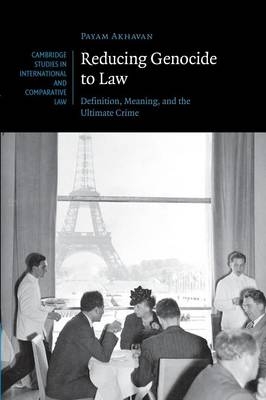
Reducing Genocide to Law
Cambridge University Press (Verlag)
978-1-107-48005-6 (ISBN)
Could the prevailing view that genocide is the ultimate crime be wrong? Is it possible that it is actually on an equal footing with war crimes and crimes against humanity? Is the power of the word genocide derived from something other than jurisprudence? And why should a hierarchical abstraction assume such importance in conferring meaning on suffering and injustice? Could reducing a reality that is beyond reason and words into a fixed category undermine the very progress and justice that such labelling purports to achieve? For some, these questions may border on the international law equivalent of blasphemy. This original and daring book, written by a renowned scholar and practitioner who was the first Legal Advisor to the UN Prosecutor at The Hague, is a probing reflection on empathy and our faith in global justice.
Payam Akhavan is Professor of International Law at McGill University in Montreal, Canada. He was the first Legal Advisor to the Prosecutor's Office of the International Criminal Tribunals for the former Yugoslavia and Rwanda at The Hague (1994–2000) and has served with the United Nations in Cambodia, East Timor and Guatemala. He is also the author of the Report on the Work of the Office of the Special Advisor of the United Nations Secretary-General on the Prevention of Genocide (2005), has served as Chairman of the Global Conference on the Prevention of Genocide (2007) and is Co-Producer of the documentary film 'Genos.Cide: The Great Challenge' (2009).
1. The power of a word; 2. The taxonomy of crimes; 3. The core elements of international crimes; 4. A hierarchy of international crimes?; 5. Naming the nameless crime; 6. Who owns 'genocide'?; 7. Contesting 'genocide' in jurisprudence; 8. Silence, empathy, and the potentialities of jurisprudence.
| Reihe/Serie | Cambridge Studies in International and Comparative Law |
|---|---|
| Zusatzinfo | Worked examples or Exercises; Printed music items |
| Verlagsort | Cambridge |
| Sprache | englisch |
| Maße | 152 x 229 mm |
| Gewicht | 290 g |
| Themenwelt | Geisteswissenschaften ► Geschichte |
| Recht / Steuern ► EU / Internationales Recht | |
| Recht / Steuern ► Öffentliches Recht ► Völkerrecht | |
| Recht / Steuern ► Strafrecht ► Kriminologie | |
| Sozialwissenschaften ► Politik / Verwaltung | |
| ISBN-10 | 1-107-48005-1 / 1107480051 |
| ISBN-13 | 978-1-107-48005-6 / 9781107480056 |
| Zustand | Neuware |
| Haben Sie eine Frage zum Produkt? |
aus dem Bereich


